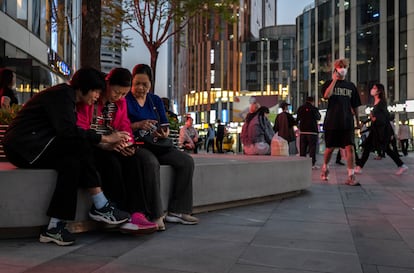WeChat, the Chinese ‘everything app’ that inspired Elon Musk to turn Twitter into X
From sharing payments to calling a taxi or filing for a divorce, this platform centralizes almost every daily activity, thus becoming the most voracious data collection tool

Many of us cannot remember what life without smartphones was like. In China’s case, what is impossible to imagine is life without a specific app: WeChat. There is nothing more common in the Asian country than this super-app, which is used for absolutely everything, everyday. There, when you meet someone, they don’t ask for your business card, your Instagram account or your phone number; they ask for your WeChat. When you want to pay in an establishment, they don’t ask “cash or credit card?”; the consumer automatically unlocks their phone and shows a QR code generated by the application. Everyday actions like meeting friends, ordering food, paying bills, taking a taxi or buying movie or train tickets are all done through WeChat. But not only that: you can also book a doctor’s appointment, apply for a loan or even file for divorce. For many Chinese, WeChat and the internet are one and the same.
The platform, developed by the Chinese technology giant Tencent, becomes essential the minute one sets foot in the country (showing a health code generated in the app to go through immigration is still required) and it is the one that inspired Elon Musk to transform Twitter (now X) in an application that integrates information, communication, payment and service functionalities – in his own words, an “everything app.” WeChat is the best example of this type of platform, which does not exist in the United States or Europe, but is common in Asia. A tool with more than one billion active monthly users only within China.
Weixin (its Chinese name) debuted in 2011 as a simple WhatsApp-style instant messaging platform, although it integrated voice messages, group video calls and stickers much earlier. The application also became an alternative to Facebook, Instagram and Twitter, which are banned in China, allowing users to share photos, songs, texts or links to articles. It even offered Tinder-like features, such as “people nearby” or a much more creative one, a “drift bottle” one could send out into cyberspace with the hope that someone would find it. More recently, a “Channels” option was added, which acts as Douyin (the Chinese version of TikTok). In addition, as Tencent is one of the largest online gaming companies on the planet – it is the creator of Fortnite and League of Legends – you can also play online through WeChat.
But WeChat’s first major revolution beyond social media came just four years after its launch, when it combined online shopping and payment functionalities that until then were only available through different e-commerce and mobile banking apps. WeChat Pay is, together with Alipay (which is managed by Ant Group, a subsidiary of Alibaba), the largest mobile payment service available in the Asian giant. The WeChat virtual wallet can be linked to credit and debit cards and lets users send money to friends in a much simpler and more intuitive way than platforms like PayPal, all without fees. Among the most popular features is a shared account where people can enter expenses in a group (and choose who has to pay) and the option to give money in a hongbao or “red envelope,” very popular during Lunar New Year celebrations or weddings.

Later on, the Shenzhen-based firm invested in other big companies to integrate their services into WeChat, such as e-commerce companies JD.com and Pinduoduo, the ridesharing company Didi Chuxing and the food delivery company Meituan. Thus came the second major innovation of the platform: the so-called “mini-programs,” lite versions of third-party apps that people can use without leaving WeChat or having to download or install anything else. In addition, through the official accounts of different public departments (health, education, taxes, traffic, etcetera) one can find social security information, pay fines and book appointments for bureaucratic procedures or to go to the hospital.
From a practical perspective, WeChat saves users time and storage space. However, it does so at the cost of their privacy: the app knows your location, your habits, your tastes, what you talk about and endless personal information that the users share from the moment they open their eyes until they go back to bed. It is considered by many experts to be the most complete and intelligent data collection tool in the world, one that has helped Beijing organize all aspects of daily life and maintain control of the country. This became evident during the pandemic: under the strict zero Covid-19 policy, it was mandatory to show, for absolutely everything (even to enter your place of residence), a health code generated by the application, which was key to detecting possible positive cases and decree confinements.
WeChat’s massive reach into every corner of its users’ lives has raised concerns about the censorship and the surveillance that authorities can exercise through it. Posts that question the official discourse disappear in a matter of minutes, and there are increasingly more critical voices whose accounts have been suspended for speaking against the government. Bear in mind that the success of the app is due, to a large extent, to the particular digital environment of the Asian giant, where the services that people use every day in Europe and the United States are blocked – as well as many international media outlets, including EL PAÍS.
Sign up for our weekly newsletter to get more English-language news coverage from EL PAÍS USA Edition
Tu suscripción se está usando en otro dispositivo
¿Quieres añadir otro usuario a tu suscripción?
Si continúas leyendo en este dispositivo, no se podrá leer en el otro.
FlechaTu suscripción se está usando en otro dispositivo y solo puedes acceder a EL PAÍS desde un dispositivo a la vez.
Si quieres compartir tu cuenta, cambia tu suscripción a la modalidad Premium, así podrás añadir otro usuario. Cada uno accederá con su propia cuenta de email, lo que os permitirá personalizar vuestra experiencia en EL PAÍS.
¿Tienes una suscripción de empresa? Accede aquí para contratar más cuentas.
En el caso de no saber quién está usando tu cuenta, te recomendamos cambiar tu contraseña aquí.
Si decides continuar compartiendo tu cuenta, este mensaje se mostrará en tu dispositivo y en el de la otra persona que está usando tu cuenta de forma indefinida, afectando a tu experiencia de lectura. Puedes consultar aquí los términos y condiciones de la suscripción digital.









































